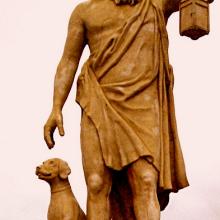
Diogenes of Sinope lived from c.412–c.323 BC in Ancient Greece, and was a philosopher of the Cynic school.
He is said to have travelled by day carrying a lantern as he searched for an honest man. It sounds like a terrible joke even after 2,336 years.
Like other Cynics, he lived simply and spoke plainly, seeking to overcome his emotions, thoughts and living conditions in a bid to achieve the virtuous state of arete.
Various stories attach to the philosopher, including one in which he is supposed to have attended a feast. Playing on the eccentric's nickname (Kynos, meaning dog), some of the other guests humorously tossed their chewed-over bones at him. Diogenes played 'a dog's trick' on the guests in return, humorously urinating all over them.
Perhaps it was with similar warm and wet surprises in mind that he came up with the thoughts on disgusting wine currently displayed outside Villeneuve on Broughton Street.
We were glad to read the staff's parting observation (see below).
From Cynicism to Optimism: a state of mind often attributed to the German philosopher Gottfried Liebnitz (1646–1716).
Grotesquely boiled down, Liebnitz's belief was that we inhabit the best world which God could possibly have created.
Blind or groundless Optimism was satirised by Voltaire in the character of Dr Pangloss in Candide. However, if things are already at their best, they cannot get better, so 'Panglossianism' cannot possibly be attributed to Curiouser and Curiouser.
Here, staff labour under the delusion that better weather is just around the corner.